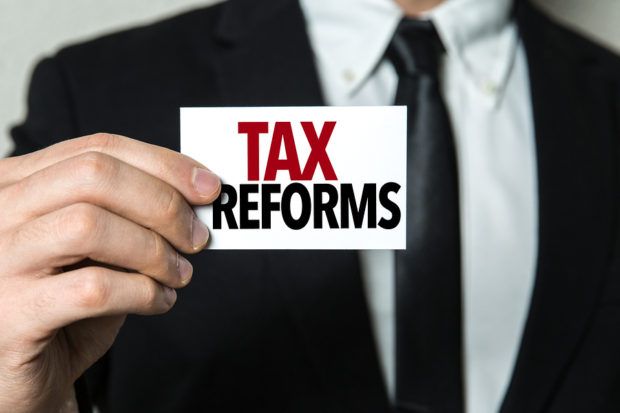W.R. Berkley Corp. President and CEO Robert Berkley Jr. referred to the Trump tax cuts as a “double plus” that will benefit domestic insurers in a number of ways in the months ahead.
“From our perspective, this is a double plus, if you will,” Berkley said during the insurer and reinsurer’s Q4 2017 earnings call on Jan. 30.
 Berkley explained that “domestic-based insurers” will benefit along with the rest of corporate America from a lower tax rate. (Under the legislation, insurers, agencies and other businesses organized as C corporations get a statutory tax rate cut from a top rate of 35 percent to 21 percent.)
Berkley explained that “domestic-based insurers” will benefit along with the rest of corporate America from a lower tax rate. (Under the legislation, insurers, agencies and other businesses organized as C corporations get a statutory tax rate cut from a top rate of 35 percent to 21 percent.)
Berkley’s Q4 earnings reported an estimated tax benefit from the tax reform law of about $21 million, or $0.16 per share. Other companies gained far more: Chubb reported a one-time gain of $450 million due to the tax cuts. Travelers, by contrast, cited in its Q4 earnings a $129 million one-time charge relating to the new tax cut law.
Beyond the short-term monetary savings, however, there is another gain from the tax law changes. Berkley noted the tax cuts also help make things more competitive for domestic-based insurers.
“This concept of leveling the playing field is very meaningful,” he said.
Berkley said the tax cut benefits should last for the long term.
“There has been some speculation that this new reality is going to get dissipated through competition,” Berkley said. “That is not going to happen, [and] to the extent that it does, it will not happen for many years.”
Berkley also sounded off on a number of other issues. Here are some highlights:
- The reinsurance market climate. “The good news is it is a little bit less lousy than it has been in the past, and hopefully it will even be better tomorrow.”
Berkley said that the Jan. 1 reinsurance renewals showed some sparks of life, but “we were really taken aback that the property reinsurance market did not get much traction.” He noted that some segments of the market saw rate hikes due to the catastrophe loss onslaught of the 2017 second half, but he would have expected a more “robust” level.
Catastrophe reinsurance market signs were more positive, however, showing some momentum. Why might that be? “The casualty market does not face the same surplus of capital or pressure from alternative capital that the property market faces,” Berkley explained.
- The insurance market climate. Berkley had positive things to say about the insurance climate, noting that “there is more momentum” and pricing leverage today than a year ago.
- Workers comp. Berkley said this is less promising, “though we still like the margin in a lot of that marketplace.”
- Professional liability. “The one piece of the insurance market that is making us pause and scratch our heads a little bit is professional liability,” Berkley said. “It is a very broad marketplace, with a variety of very different classes or exposures under that umbrella.” He added that he believes the segment is “becoming ever more ripe for hardening” and should get there within the next 12 to 18 months.





















 State Farm Mutual to Pay $5B Dividend to Auto Insurance Customers
State Farm Mutual to Pay $5B Dividend to Auto Insurance Customers  10 Do’s and Don’ts of a Smart ORSA Report
10 Do’s and Don’ts of a Smart ORSA Report  Machine Learning for Mutuals: What’s Working, What’s Not, and What’s Next
Machine Learning for Mutuals: What’s Working, What’s Not, and What’s Next  Large Scale Cargo Ring Busted in LA, $5M Recovered
Large Scale Cargo Ring Busted in LA, $5M Recovered 











